French mathematician Blaise Pascal wrote the following in a letter back in 1657:
"Je n’ai fait celle-ci plus longue que parce que je n’ai pas eu le loisir de la faire plus courte."
"I only made this letter longer because I had not the leisure to make it shorter."
🧵
"Je n’ai fait celle-ci plus longue que parce que je n’ai pas eu le loisir de la faire plus courte."
"I only made this letter longer because I had not the leisure to make it shorter."
🧵
https://twitter.com/mobeen_hameed/status/1576418080695410689
This is a MEGA thread for those interested in the full story.
Call this a table of contents, if you may. The things I will be talking about.
1.The Who's who?
2.The Panama Papers
3.The "Revelations"
4. The Supreme Court proceedings
5.The JIT Report
6.The Aftermath
Call this a table of contents, if you may. The things I will be talking about.
1.The Who's who?
2.The Panama Papers
3.The "Revelations"
4. The Supreme Court proceedings
5.The JIT Report
6.The Aftermath
Feel free to correct me or add more details wherever necessary.
Most of this is from basic research I had conducted back in April 2016. Much has changed since then, but unfortunately we haven't progressed as much. We have to start from somewhere, so why not the recent past.
Most of this is from basic research I had conducted back in April 2016. Much has changed since then, but unfortunately we haven't progressed as much. We have to start from somewhere, so why not the recent past.
While we have recovered from previous shocks; the multiple times the system was derailed by vigilantes in uniform, duly enabled and assisted by #PoliticiansInRobes, we still cannot seem to recover from this one and its repercussions will remain till the original sin is recognized
So let's start with Panama.
Panama is a small country-state with a population of 4 Million, occupying a key territory in Central America connecting North & South America. The economy is largely service based. 9.3% of its GDP came from financial intermediation alone (2016).
Panama is a small country-state with a population of 4 Million, occupying a key territory in Central America connecting North & South America. The economy is largely service based. 9.3% of its GDP came from financial intermediation alone (2016).

The US has a Free Trade Agreement since 2012 with Panama which forces the Panamian authorities to disclose names of all US citizens with offshore holdings via the Foreign Account Tax Compliance Act (FATCA).
On February 2016, Panama was taken off the Financial Action Task Force (FATF) AML/CFT Increased Monitoring List (aka "grey list).
Pakistan was also taken off this list just a year earlier on February 2015.

Pakistan was also taken off this list just a year earlier on February 2015.


Countries all over the world fight for capital inflow in the form of tourism, investments, development aid, and other means. As a result, nation states have developed legislation that favor the economy by attracting investment.
Competition pushes countries to extremes and some like Panama, BVI, the Cayman Islands and US states like Nevada, have established facilities for the international business community to conduct transactions between two states with differing tax laws. Thus known as ‘tax havens.'
Inheritance laws differ between states and religions. Some offshore companies are used as trusts which are to carry out legal transactions in the light of an event. Pakistan’s inheritance laws differ widely from that of the UK’s, where assets are treated differently.
In short, an offshore company can help avoid forced taxation, and allow religious systems and states to practice their inheritance system, which is a private matter of how private wealth is to be distributed amongst a family.
International Consortium of Investigative Journalists (ICIJ) is a group of journalists brought together under the umbrella of the Centre of Public Integrity, headquartered in Washington DC, and sponsored (in 2016) by organizations such as
the Ford Foundation,


the Ford Foundation,

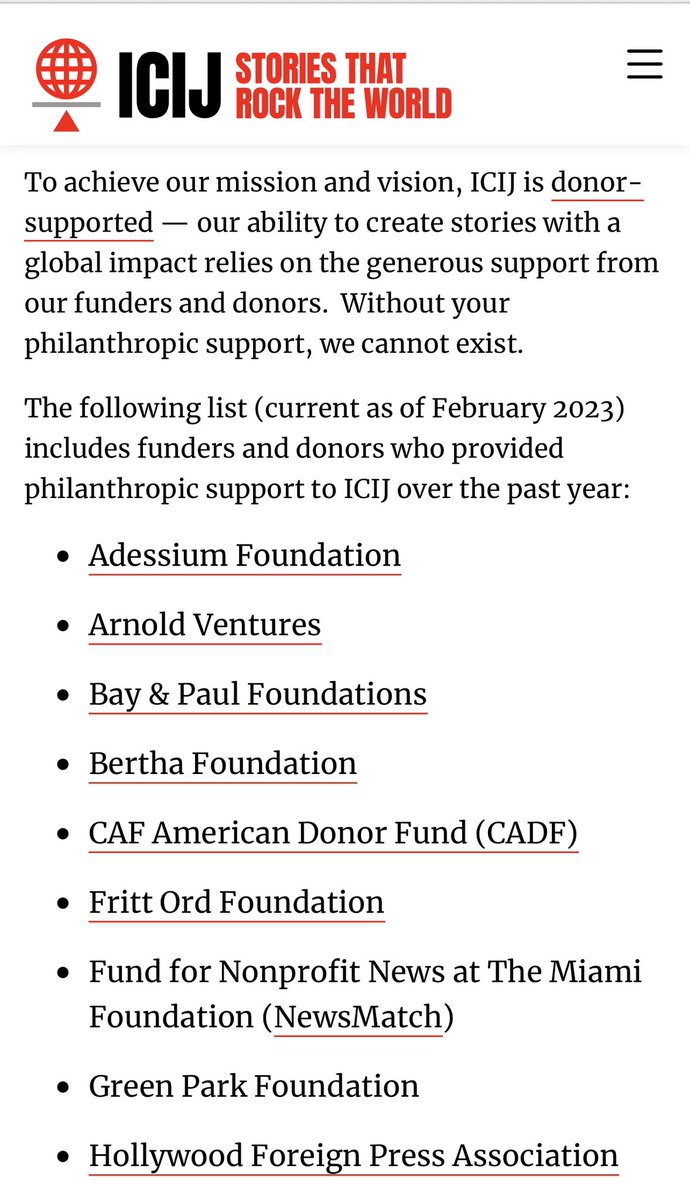

Rockafella Foundation and still funded by Open Society Foundations of George Soros, a Jewish multi-billionaire known for breaking the Bank of England by short selling the pound, and his suspicious activities and presence during other financial crises. A classic speculator. 






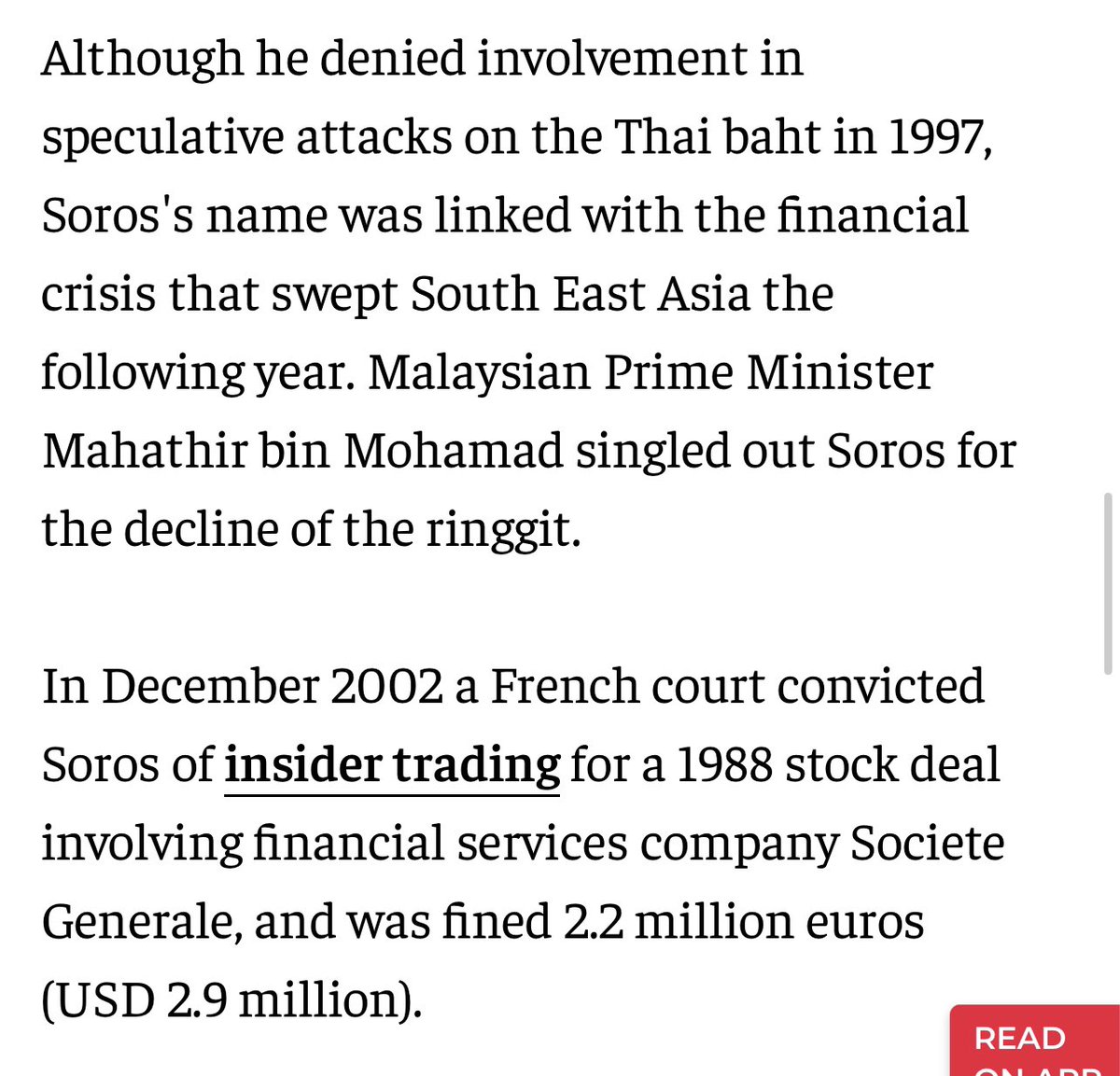
Mossack Fonseca (1975-2018) was a large Panamian law firm which offered legal services for businessmen interested in setting up companies including offshore companies around the globe. 
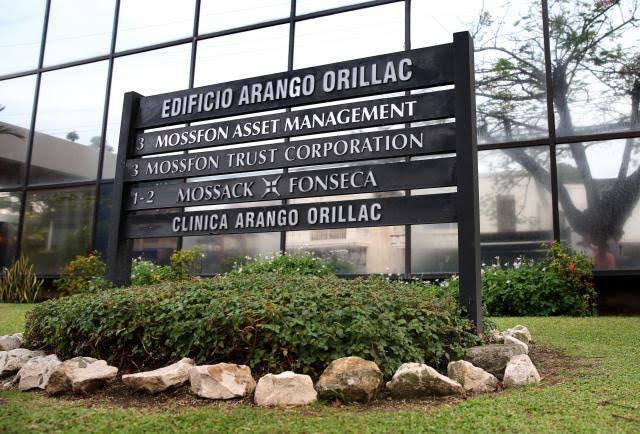
Mossack Fonseca was in operation since 1975, and prior to 2016, had never been summoned to court for any wrongdoings in its 40 year history. It is owned by German lawyer Jurgen Mossack, and Panamian novelist/lawyer Ramon Fonseca. 

Now this is where things start to get a bit interesting. This was part of the leaks but never received that much media attention. 

During World War II, Jurgen Mossack’s father, Erhad Mossack was a Rottenfuhrer in the Waffen-SS, part of the Totenkopf (the 'death head' squad) which was the armed wing of the Schutzstaffel, a paramilitary organization established to ensure the racial policy of Nazi Germany. 



Jurgen's father, Erhad was born in 1924. He joined the 'Hitler-jugend' (Hitler-youth) in 1939 at the 'tender' age of 15.
He was arrested after VE-day by the US forces on 23rd May 1946. Leaked documents give a detailed narration of the events surrounding his capture.
He was arrested after VE-day by the US forces on 23rd May 1946. Leaked documents give a detailed narration of the events surrounding his capture.
Twitter is not letting me add some photos. Not sure why, even though these are public documents.
The conclusion remains skeptical about his character and personality labeling him as a "striking example of German youth under Hitler"
Two years later, Jurgen was born in Germany. He later established Mossack Fonseca in 1975 at the 'tender' age of 27.

Two years later, Jurgen was born in Germany. He later established Mossack Fonseca in 1975 at the 'tender' age of 27.


Did Jurgen Mossack pay the price of his father's deeds? Or possibly targeted for who he was? I'm not implying that all of this is some conspiracy, and like all other theories this may also fail the test of time. I just found the coincidence too uncanny not to share with everyone.
Anyways, one fine morning, in early 2015, a journalist belonging to a German media group Suddeutsche Zeitung (SZ), received a text message from a John Doe asking him if he was “interested in data?"
They replied: "We're very interested."


They replied: "We're very interested."


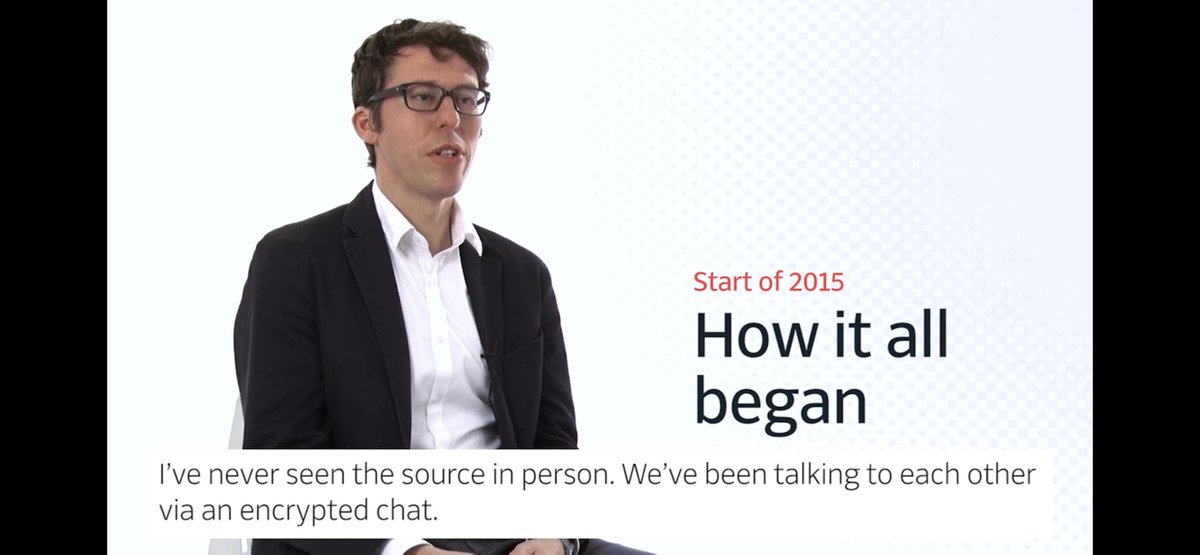
The data which included emails, database formats, PDFs, images, text documents, and other files kept in a systematic manner, in named folders, belonged to a Panamanian law firm called Mossack Fonseca. 

The journalists claim that the data was overwhelming and since they couldn't get their heads around it, they decided to approach the ICIJ. ICIJ then formed a team of journalists from all over the world.
They scanned the data 'secretly' for over a year, for names of 'power players', and attempted to connect dots that they believe would paint a true image of how offshore tax havens are operated. Till they coined the term "Panama Papers". 

On April 3, in a synchronized and coordinated manner, at exactly 2:00 p.m U.S Eastern Daylight Time, more than 100 media groups from all over the world started releasing their stories, making #PanamaPapers the number one global trend on Twitter within no time. 

On April 3, 2016, ICIJ published a feature article they had been working on for over a year. Three days later, on April 6, a book titled "Panama Papers" is also released. 

The “Panama Papers” was a leak of more than 11.5 million financial and legal records to the tune of 2.6 Terabytes of data. At the time of publication, the raw data was nowhere to be found, and the only source of information was the ICIJ, which claimed to have all the data. 

The ICIJ website with the publications have flashy stories with caricatures of major power players, former and current heads of states, and how they used offshore havens to stash “dirty money”, including Putin, King Salman and Assad. 

The list, at first looks like its arranged alphabetically, starting with President Macri of Argentina. Other notables include ex-PM of Iraq, Jordan, Sheikh Hamad (Qatar), HBJ Al-Thani, King Salman (Saudi), Sheikh Khalifa (UAE), and ends with the Australian PM, strangely. 



Let's look at HBJ's story. We will later see its relevance in the case that we will be discussing in detail later on. The ICIJ report highlights how HBJ setup offshore companies in different jurisdictions that owned properties and even his $300 million super-yacht, Al-Mirqab. 



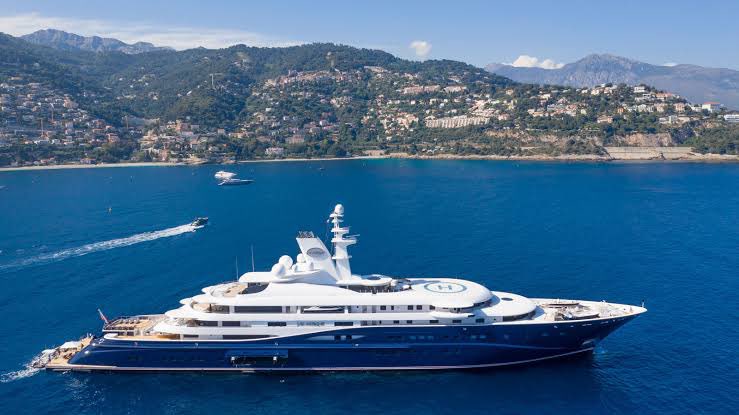

He held onto a large network of offshore companies with shareholder certificates issued to multiple people as well as "bearer certificates" whose beneficial owner is "the bearer" of the share certificate, as shown in the infographics below. 



Similar practices can be observed if we explore the data of King Salman and Sheikh Hamad Al-Thani as well. A complicated network of offshore companies with multiple beneficial owners, and undisclosed owners as well who possess bearer certificates. 



“There are legitimate uses for offshore companies, foundations and trusts. We do not intend to suggest of imply that any persons, companies or other entities included in the ICIJ Power Players interactive application have broken the law or otherwise acted improperly.”- ICIJ Legal 

The leak would have gained in credibility had it been directed to the authorities rather than "investigative journalists", who could have taken discreet, precise and swift measures to deal with any suspected illegal activity.
But apparently, John Doe didn't trust the authorities. So this 'treasure trove of data' was tortured for over a year by journalists, implicating whoever they opined to be behaving illegally. 

Even Icelandic investigative journalist and WikiLeaks spokesperson Kristinn Hrafnsson had called for the raw data to be published in full. WikiLeaks criticized ICIJ through a tweet and a pun. 👇🏼 



In turn it was criticized that the decision to disclose all documents at once would not have been right in light of “journalistic ethics”.
The response of the State of Panama was strong against allegations of its territory being used as an offshore tax haven for illegal purposes. The Procuraduria de la Nacion (Attorney General) announced an investigation where a local firm Mossack Fonseca is involved. 

This follows the re-registration of Panama in the list of tax havens by France, and the OECD Secretary General’s uni-directional attack at Panama, whereas a total of 21 other jurisdictions have also been named, with the British Virgin Islands at the forefront. 



Major Superpowers such as China and Russia, rubbished the reports, and claimed it to be a western hatched conspiracy aimed at causing instability in the region and to disrupt the revived Super Highway/One Belt One Road (OBOR) initiative of which CPEC played a very vital role.
Investigations in the United States revealed that most of the individuals named were "simply retirees buying properties abroad". No fuss about that. 

Mossack Fonsecca denied any wrongdoing, and published its reply to baseless allegations. The company claimed to not have been summoned to court once in its 40 year existence. 



In fact, many of the clients that the report mentions are not even their clients. The company policy stated that politically effected persons (PEPs) are subject to heavier scrutiny than the commoner, having to declare the source of income as well as non-affiliation with politics. 





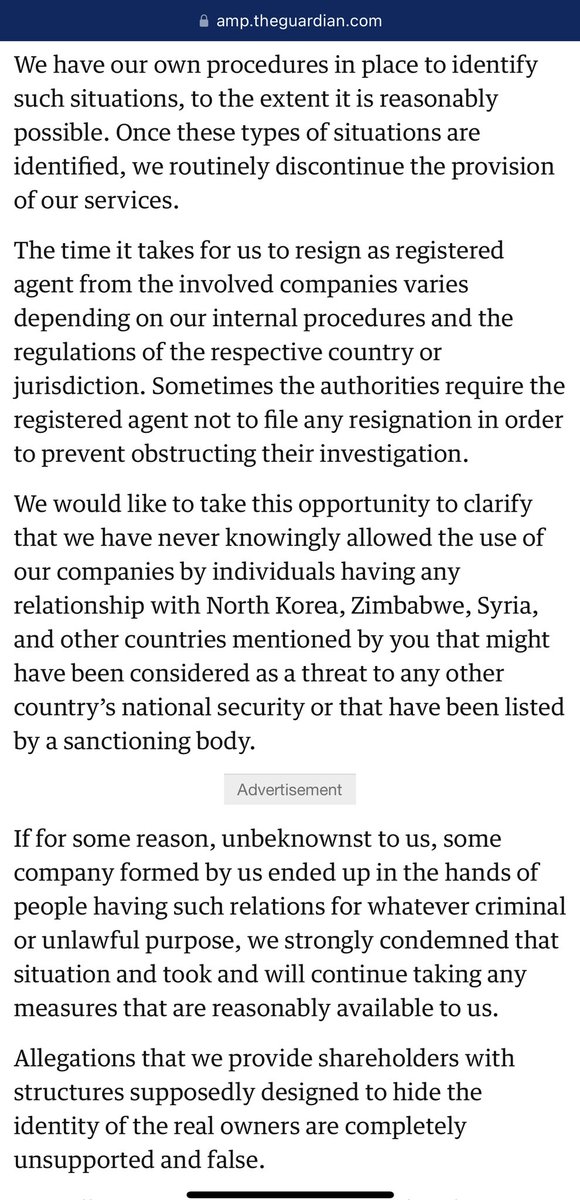

Mossack Fonseca insisted that reporting of ICIJ “rely on supposition and stereotypes”, and “play on the public’s lack of familiarity with the work of firms like ours.”
Fonseca said that the leak was not an inside job, and that the company had been hacked by servers based abroad.

Fonseca said that the leak was not an inside job, and that the company had been hacked by servers based abroad.


"Unencrypted emails, and systems older than your dog."
What possibly made things easier for the hacker to retrieve information was the fact that the security software of the Law firm’s database was last updated in 2009!

What possibly made things easier for the hacker to retrieve information was the fact that the security software of the Law firm’s database was last updated in 2009!


If a law firm were actively operating a massive money laundering network through offshore companies for the purpose to hide illicit wealth, it would not make a careless mistake as such. You would expect better. Especially when you are dealing with Kings, Emirs & heads of states.
Moving on. This is a snapshot of countries implicated in global scams. If you are from Pakistan, you will notice that Pakistan is neither highlighted nor in the list of 12 countries mentioned. Then what is all the fuss about? 

According to the ICIJ, about 200 individuals of Pakistani origin held offshore companies at one time or the other. Some influential names also popped up, but not important enough for any of the reporting agencies to write a full-fledge report about.
In Pakistan, the entire media apparatus had turned head over heels. Apparently, the PM of Pakistan had been named and shamed, and this new "revelation" could land him in hot waters.
A few days later, the book is available at almost all local book stores in Islamabad. It's a compilation of short stories that abruptly end just when they start to get spicier. I read the entire book, and couldn't find any story on Pakistan. 

Wasn't Pakistan implicated in all this? Why is there no mention of Pakistan? Why would they not write a story on Pakistan if they had all the "evidences"? There was simply no corruption story to be told. 







I mean, they tortured the data for over a year, they had hundreds of journalists working all over the world to uncover the truth. They knew about past cases of all politicians and power players. They probably did investigate some matters right? Hence the stories. But none on 🇵🇰
The "Revelations"
On the ICIJ website, some prominent names from Pakistan’s political arena popped up, including that of current senators and judges. From the international business community, the names and caricatures of the PM and his children were displayed.
On the ICIJ website, some prominent names from Pakistan’s political arena popped up, including that of current senators and judges. From the international business community, the names and caricatures of the PM and his children were displayed.

The "story" on the website is not that complicated. Mentions how unproven corruption allegations keep returning to haunt the Sharif family. To establish business in the UK, the two brothers Hussain and Hasan, used offshore companies to hold properties and use them as collateral. 

There is absolutely no mention of any crime that they may have committed in doing so.
The infographics are pretty straightforward and not as complicated as those shared earlier. They show "ownership" of Maryam Safdar of 3 companies, namely, Nielsen ltd, Nescoll ltd & Minerva Trust. Hussain Nawaz is a "signatory" of the first two, which is managed by a Trust. 



Hasan's infographic is even simpler and reveals that he is the owner of Hangon Properties managed by Mossack Fonseca with shareholdings in Cascon Holdings. Nothing more than that.
However, a few contradictions are present.
However, a few contradictions are present.

On April 3, the website had mentioned that Cascon Holdings was acquired by Hangon properties for £11.2 million. However, after a few weeks, the website was updated: the infographics were corrected. A month later, a clarification is posted stating that nothing as such happened. 

It also reveals that Mossack Fonseca committed to show more due diligence when dealing with Maryam Safdar, knowing she was a PEP who was residing with her father in Pakistan. However, the story claims they didn't offer the same to Hasan but the infographic says otherwise.
Did it have anything to do with him using his full name (Hasan Nawaz Sharif) to carry out transactions?
In a document shared by ICIJ through their website, Hasan Sharif signs three times on a money transfer request. Two are required, while the third is for a hand-written addition in the electronically generated slip. 

The hand-written addition was made by Hasan to add Nawaz as a middle name, so that there is no confusion in identifying the beneficiary. Why would a person hiding his wealth in offshore companies insist on writing his full name in the papers that could expose him without doubt? 

Offshore companies can also be setup using sham directors for an extra fee. If anyone wanted to hide their assets or their activities, they would certainly pay that extra fee.
The graphic below shows the simple process of opening an offshore company with a sham director.
The graphic below shows the simple process of opening an offshore company with a sham director.
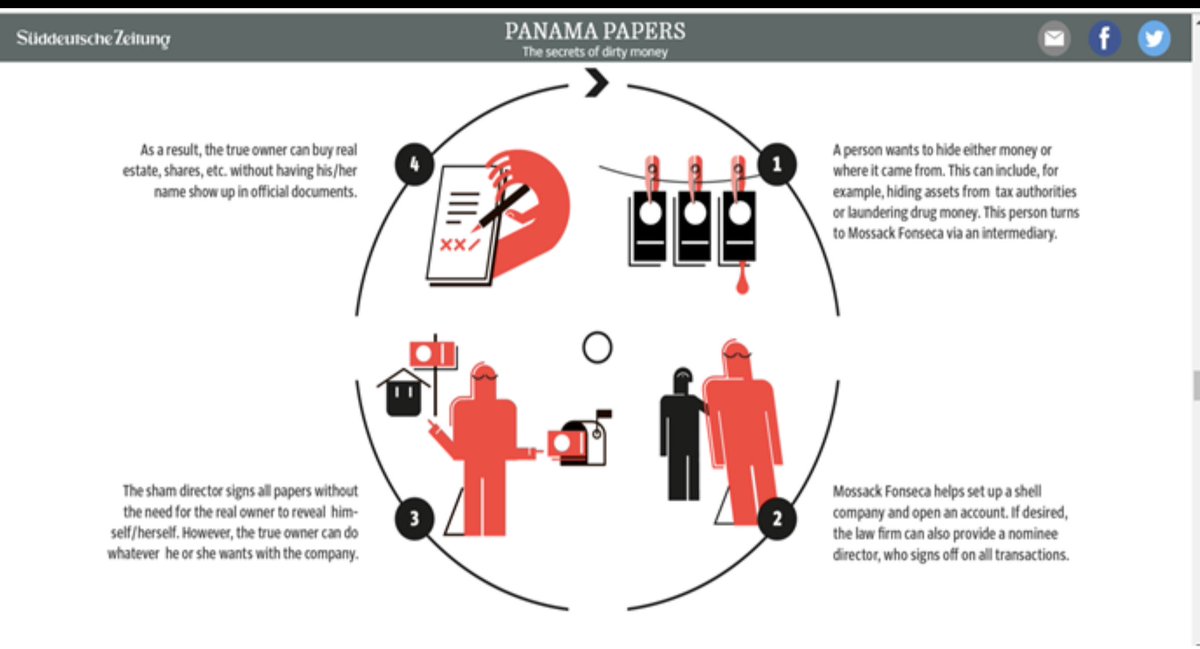
Some point towards the incorporation date of the companies. However that is not conclusive proof since many a times, law firms use already registered companies and change ownership to save process and time. So incorporation date of an offshore company is immaterial in this case. 

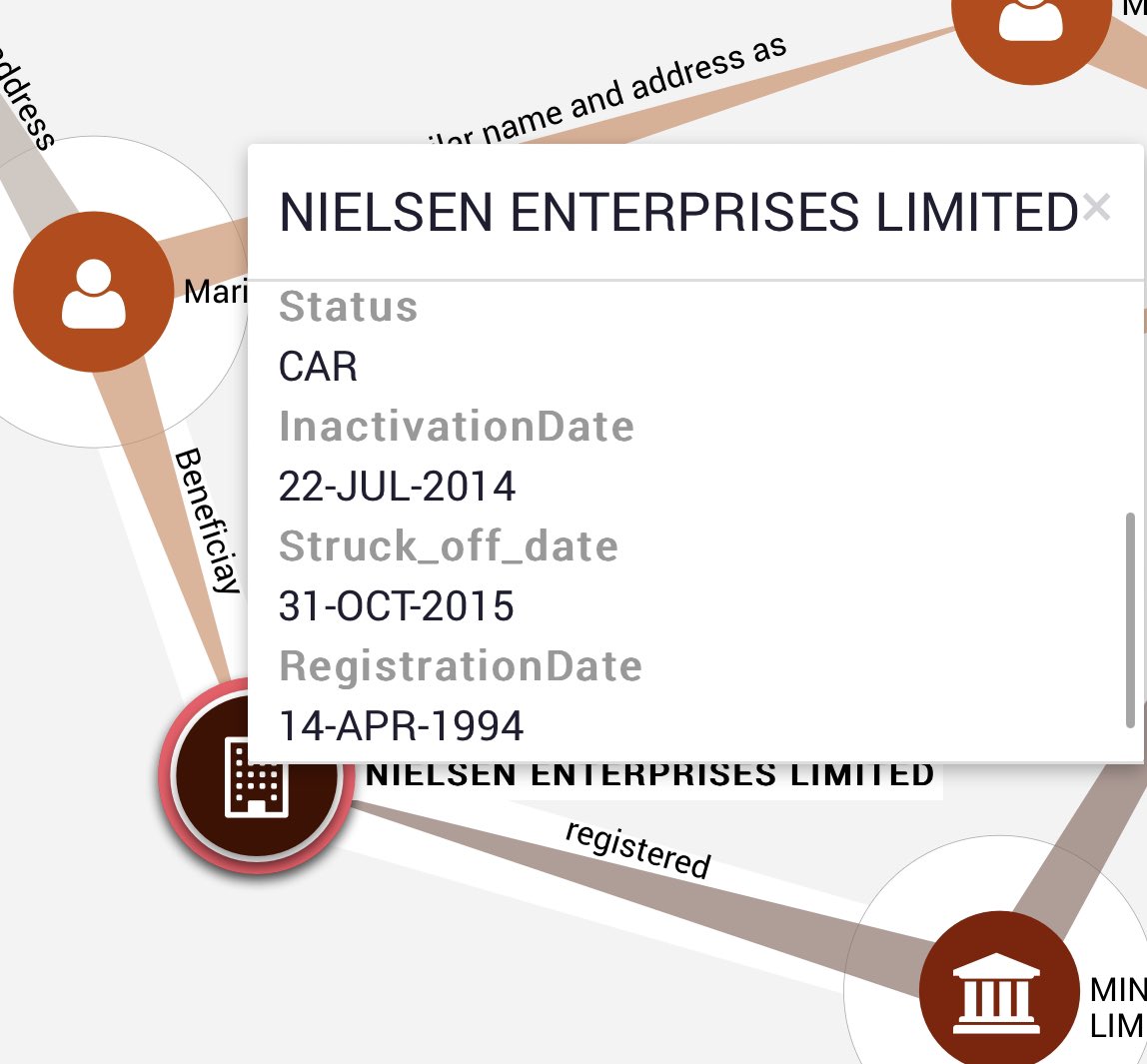

It may have possibly been registered before and brought under ownership of the Sharif family at a later date. The company’s registration date remains the same for legal purposes.
It is important to note that Nawaz Sharif’s name did not appear anywhere in the entire leak, as a beneficiary or a trustee in any of the offshore holdings. Not a single document that has his name, no passport copies, no emails. Nothing.
PM Sharif came out strong against the allegations. He admitted his family owned the apartments, and that they had never denied it. He explained that the apartments were purchased from the sale proceeds of Gulf Steel mills which were sold between 1978-80 for about $9 million. 

Nawaz Sharif's father, Mian Sharif, the respected business tycoon who had established his empire twice since 1939, was very much alive throughout the 1990s, endured exile twice with his family and finally passed away in 2004.
As head of the family, Mian Sharif had kept Nawaz Sharif isolated from the family business for obvious reasons. I doubt he would have left any tracks behind that would lead to his son, the most successful politician the country has created to date.
Defending his children's businesses, he said his children were independent in their pursuits and had used the money from the sale of their plant in Makkah which was setup by the Late Mian Sharif following the military coup of 1999, as well as loans to setup their businesses. 

Both brothers, Hussain and Hasan, have had bitter experiences in Pakistan. Under General Pervez Musharraf’s rule, they were kept in solitary confinement for months, in unknown places and at times Hussain recalls that his 2 year old son had to witness their torture.
The psychological impact on the 2 year old along with Hasan and Hussain who were charged with no crime, is enough for one to choose to migrate and live elsewhere where they can practice freely.
No harm in choosing to pursue your career where you have spent most of your life. Pretty straightforward. Nothing that doesn't make logical sense. Moreover it helps to avoid any conflict of interest, being children of a sitting PM.
But what happened next in Pakistan, will leave you shocked. Now we will turn to how this illegally acquired information about private family matters was used as a political weapon to take down the opposition and destabilize the region, which sadly remains destabilized till date.
Panama Papers somehow proved allegations that Imran Khan had been leveling on the Sharif Family. He claimed that the properties actually belong to PM Sharif and he should provide the court with evidence of the "money trail" for these purchases. Sharif denies making the purchases. 

The "money trail" was expected to be produced by someone who wasn't even privy to all the transactions. Over a decade had passed since the death of the man who had made these purchases for his grandchildren. Yet the PM was made to explain. 
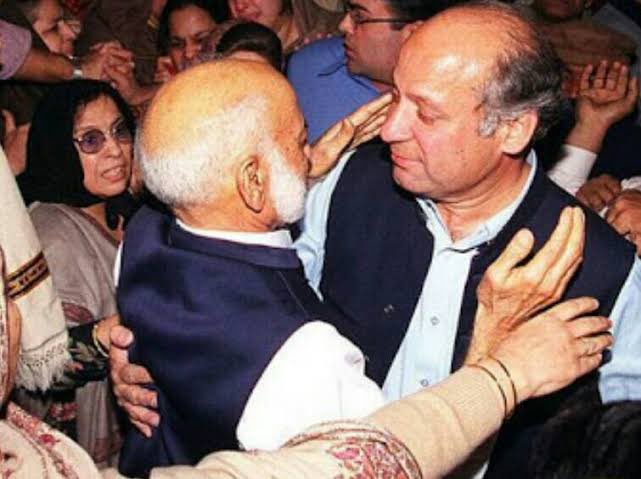
Sharif was quick to address the nation and clarify his position. He proposed a Judicial Commission headed by a retired judge that could investigate the matter. This was to save the SC from getting embroiled in a political issue and instead focus on their backlog of cases. 😕 

However this proposal is shot down by PTI & eventually the SC registrar, who claims that the commission would be toothless and it would take years to complete the inquiry. Did they want to put a time-limit on ascertaining the truth? But why? Was it a National Security issue? 

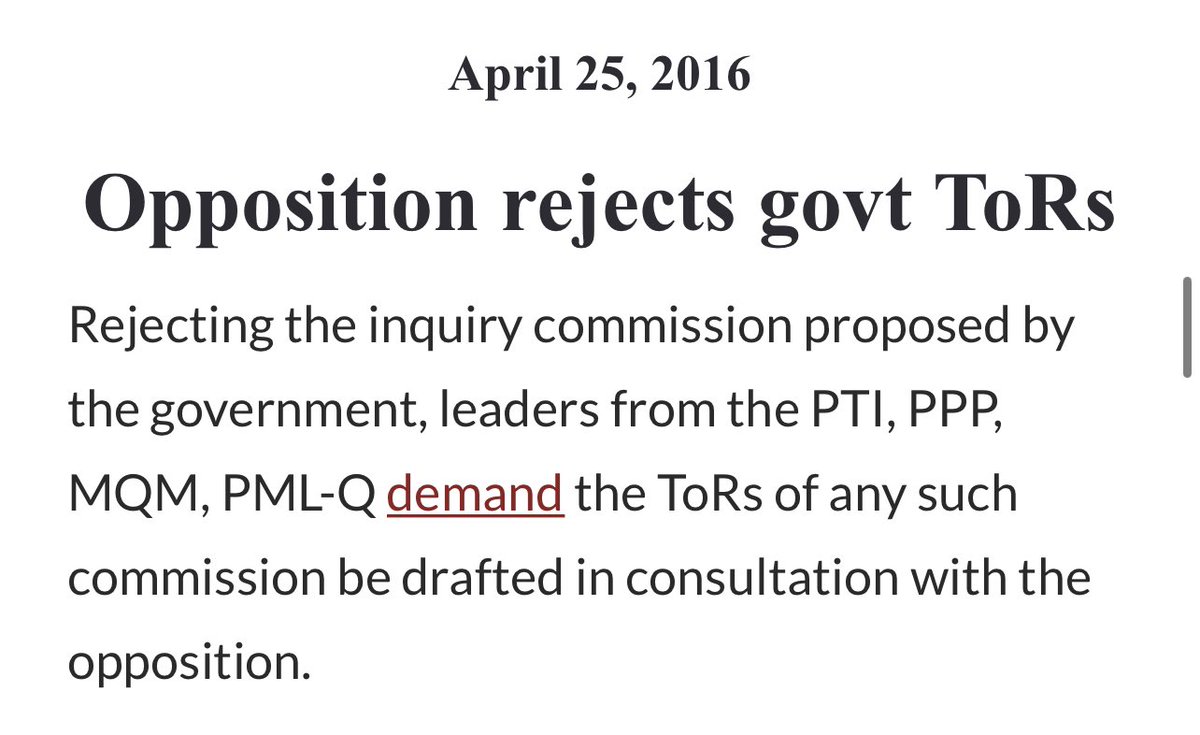

There is a lot of back and forth while deciding the Terms of Reference (ToRs) of the inquiry. PTI wanted it to be person-specific whereas the government wanted it to be broader to include all those involved. 







COAS Raheel Sharif steps in and asks the PM to resolve the issue as quickly as possible. Sharif flies off to London soon after for a pre-scheduled heart surgery. He returns 48 says later, looking lighter and relaxed. 




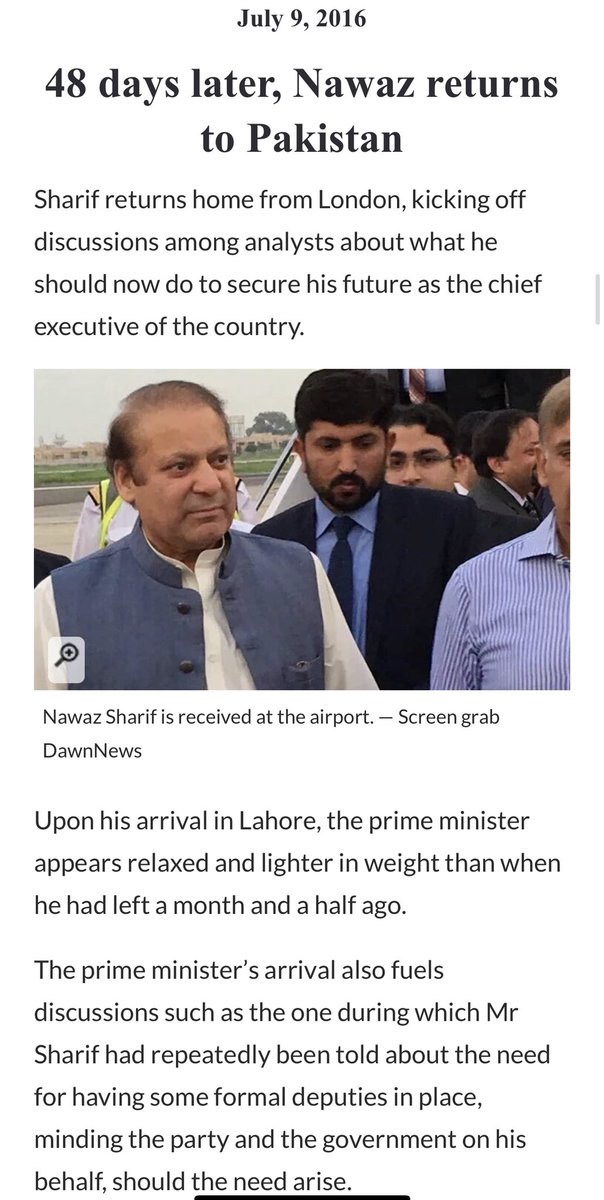
Khan turns his guns towards the judges who were scared to the point that they tried their best to avoid confrontation. He had already maligned two former CJPs including 3 former Judges of the SC, during his 126 day sit-in, as well as made life misery for the sitting judges. 


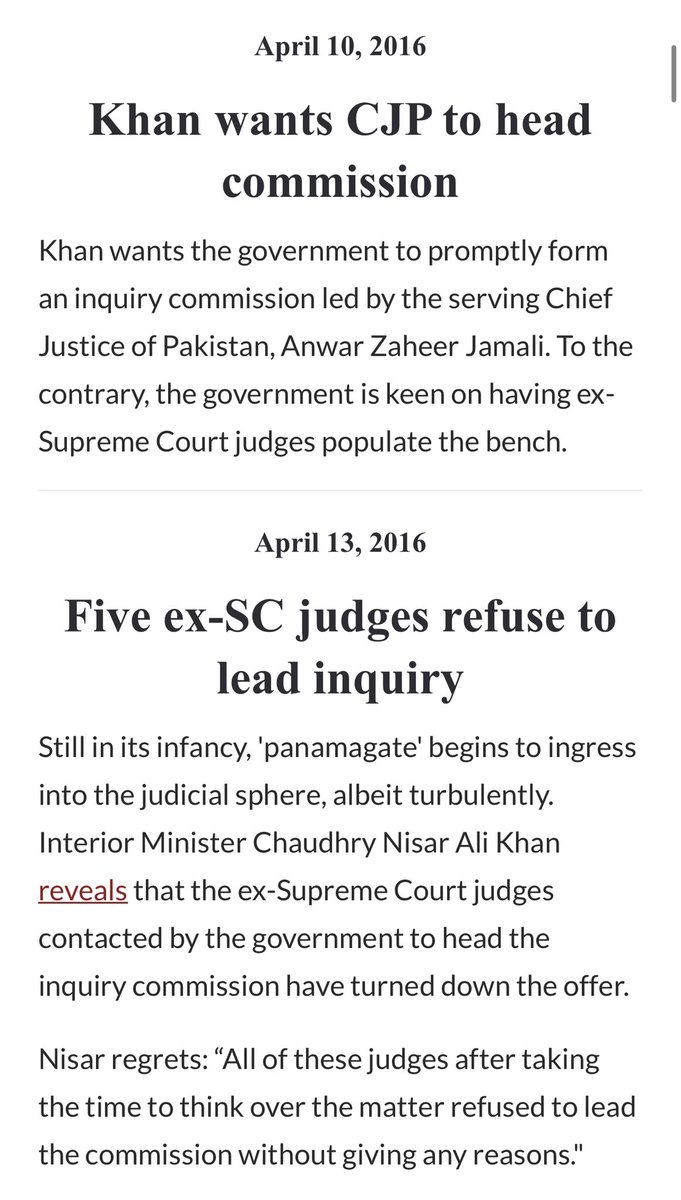
The Supreme Court proceedings
Jamaat-e-Islami files a petition in the SC but it is termed frivolous and thrown out 4 days later. Meanwhile, Khan builds pressure by announcing protests outside Sharif's residence and threatens to "lockdown" Islamabad.



Jamaat-e-Islami files a petition in the SC but it is termed frivolous and thrown out 4 days later. Meanwhile, Khan builds pressure by announcing protests outside Sharif's residence and threatens to "lockdown" Islamabad.


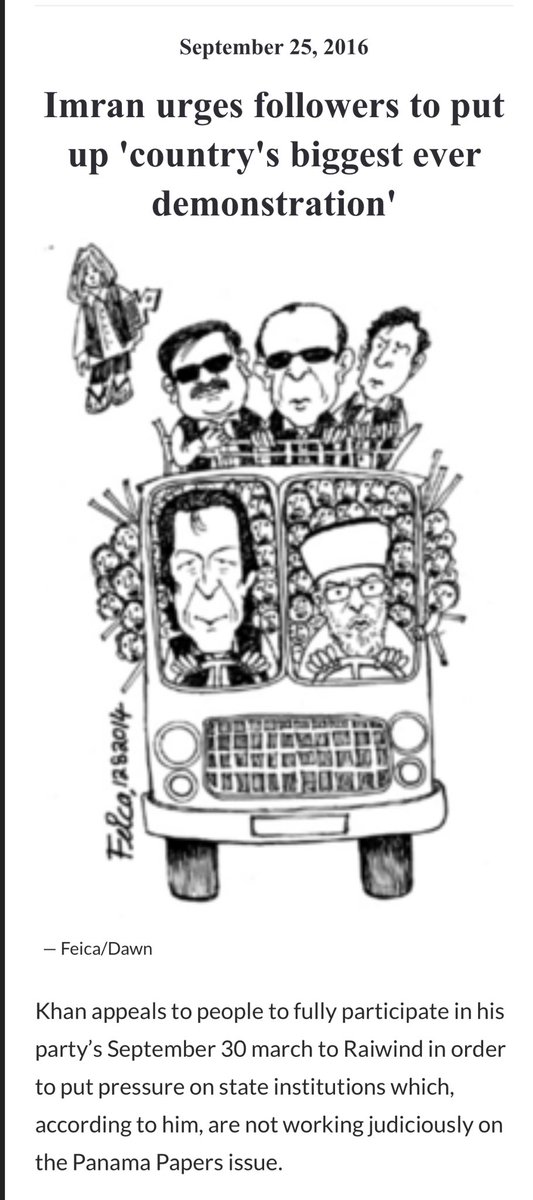

Many opposition parties pull out finding the idea unethical. The turnout remained dismal. Frustrated IK starts planning his next rally to Islamabad. But to save face, the SC intervenes and accepts PTI's identical petition, which was no different than JI's. 







Sharif welcomes the move and hopes that the matter will be resolved once and for all. Initially it is a 3-member bench, but it is reconstituted into a larger 5-member bench under the then CJP Anwar Zaheer Jamali. 




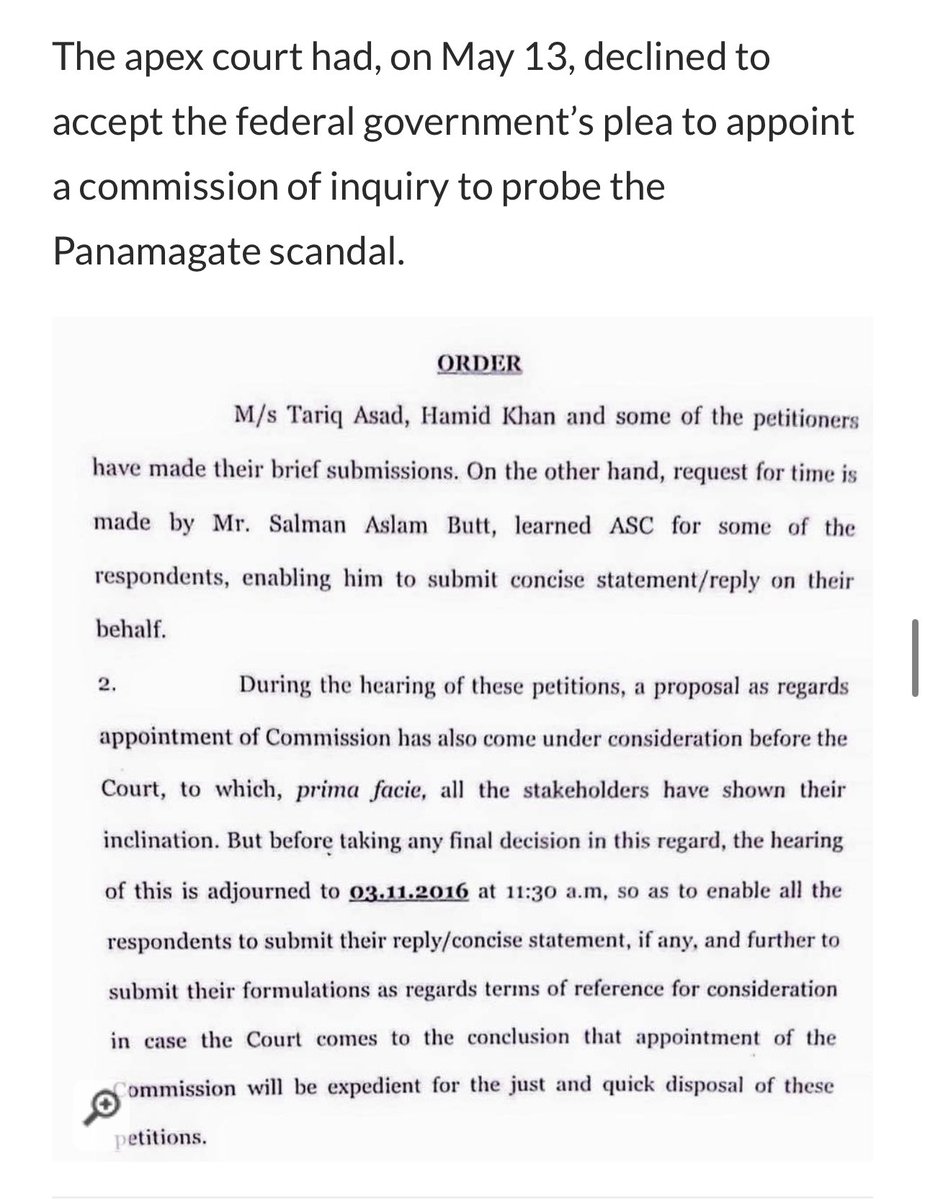
The proceedings begin and the PM's children submit their responses. PTI also presents the evidence it gathered against the Sharifs, but the SC tears it apart. Justice Azmat Saeed remarks that these "evidences" are only good for "selling pakoras." 



The SC does pose new questions for the defendants to explain exactly how the money from the steel mill reached UK. This is when the family presents a letter from the former PM of Qatar, HBJ Al-Thani. 



He certifies that an amount (12 million dirhams) was invested in the real estate business of the Al-Thani family by Mian Sharif. The accounts related to this investment were finally settled in 2006. He had wished for Hussain Nawaz to be the ultimate beneficiary. 

After Mian Sharif passed away in 2004, the investment was settled in 2006, by way of delivery to Mr Hussain Nawaz Sharif's representative, bearer shares of Nescoll ltd and Nielsen ltd, which had been kept during that time in Qatar.
Remember HBJ's network of offshore companies, with multiple beneficial owners holding bearer shares? The leaks are, on its own, evidence of how he operates in his financial dealings. Which is only further corroborated in this letter.
That's just how he rolls.
That's just how he rolls.
https://twitter.com/khayazahmed/status/1652450622195765248

Meanwhile, the CJP has retired and the new CJP reconstitutes the bench. The new bench resumes the hearing and PTI's lawyers start playing Begum Kalsoom Nawaz's interview, at which Justice Saeed again cautions against the use of interviews and newspaper clippings as evidence. 


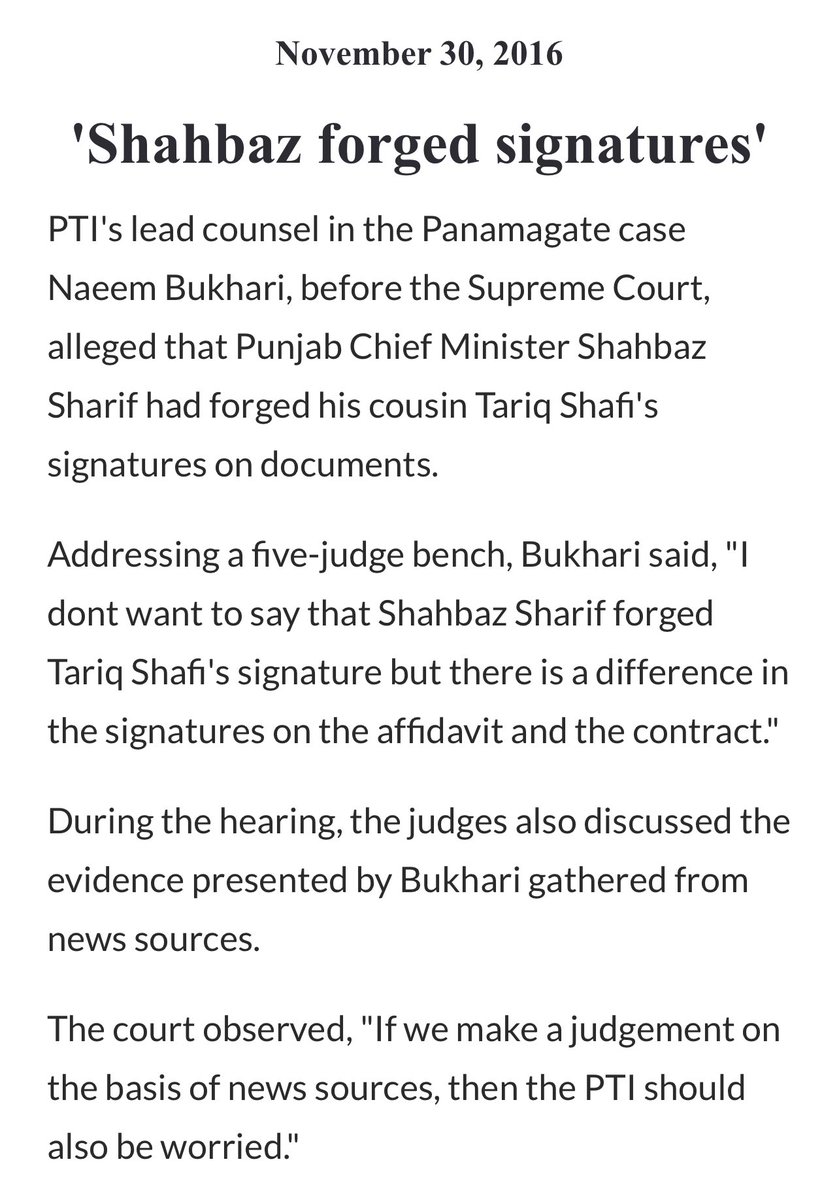

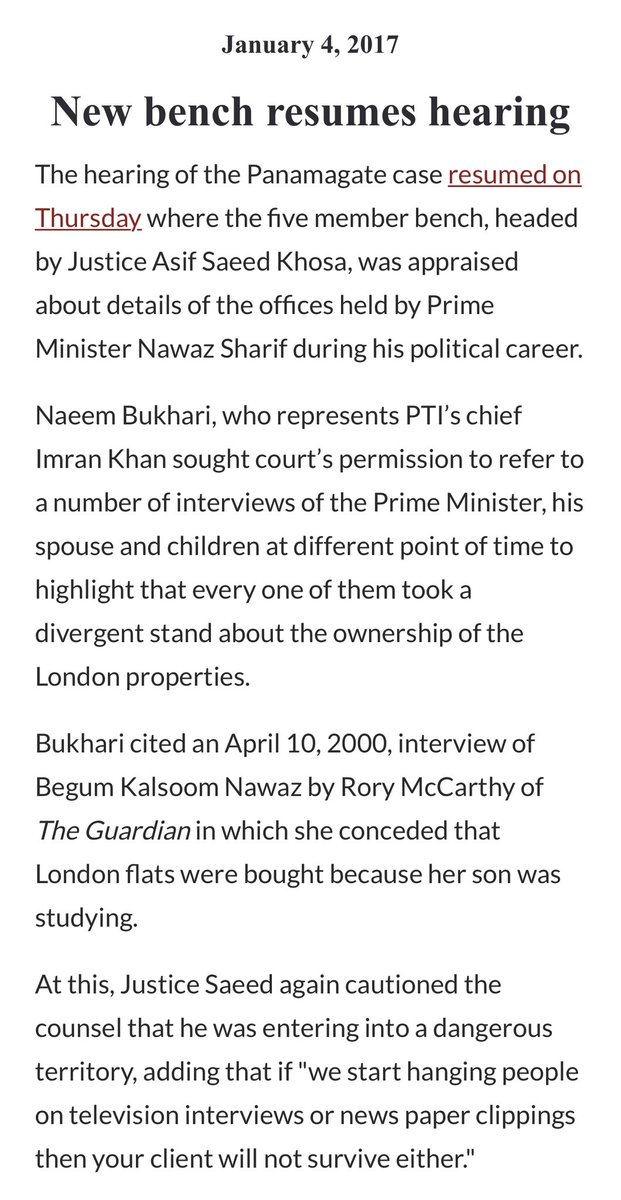
Burden of proof becomes a sticking point as Justice Khosa thinks burden of proof should lie on the Prime Minister, while Justice Ejaz and Justice Saeed disagreed. 
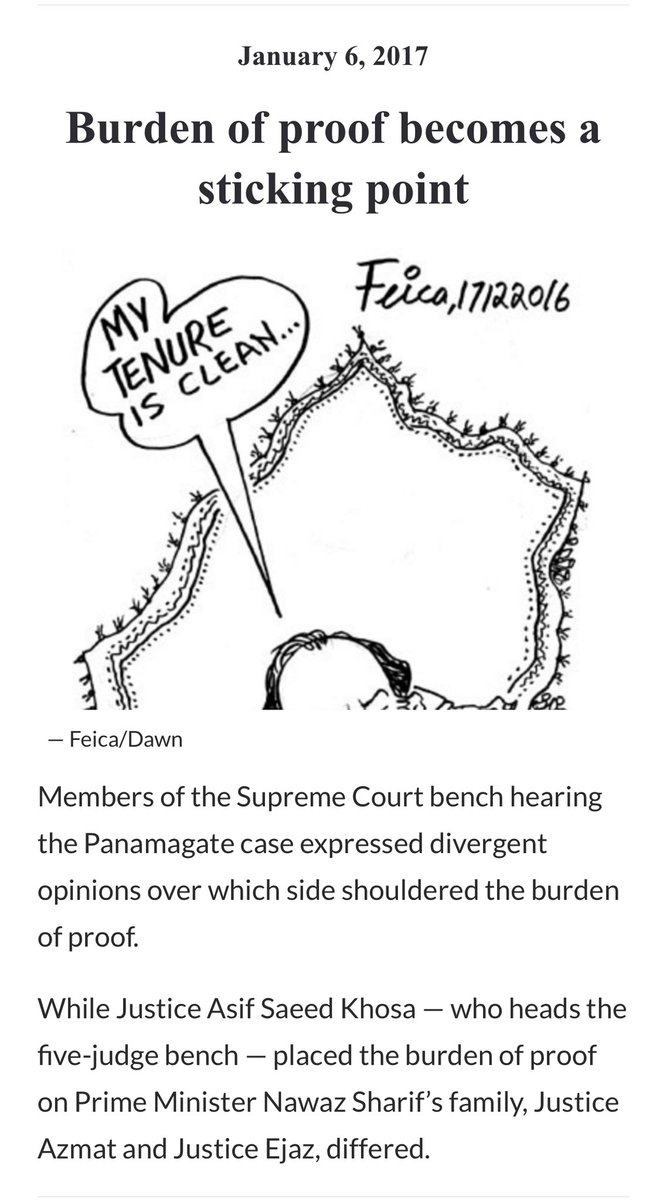
Just when the SC is pondering over the money trail submitted by the family, BBC releases a report the next day which reveals that the flats were purchased in the 1990s by two companies (Nielsen and Nescoll). As if that changes anything, but the media trial was making its impact. 



A few days later, Maryam Safdar also files her reply in the SC verifying that she is happily married to Captain Safdar, and that she is not her father's dependant. 
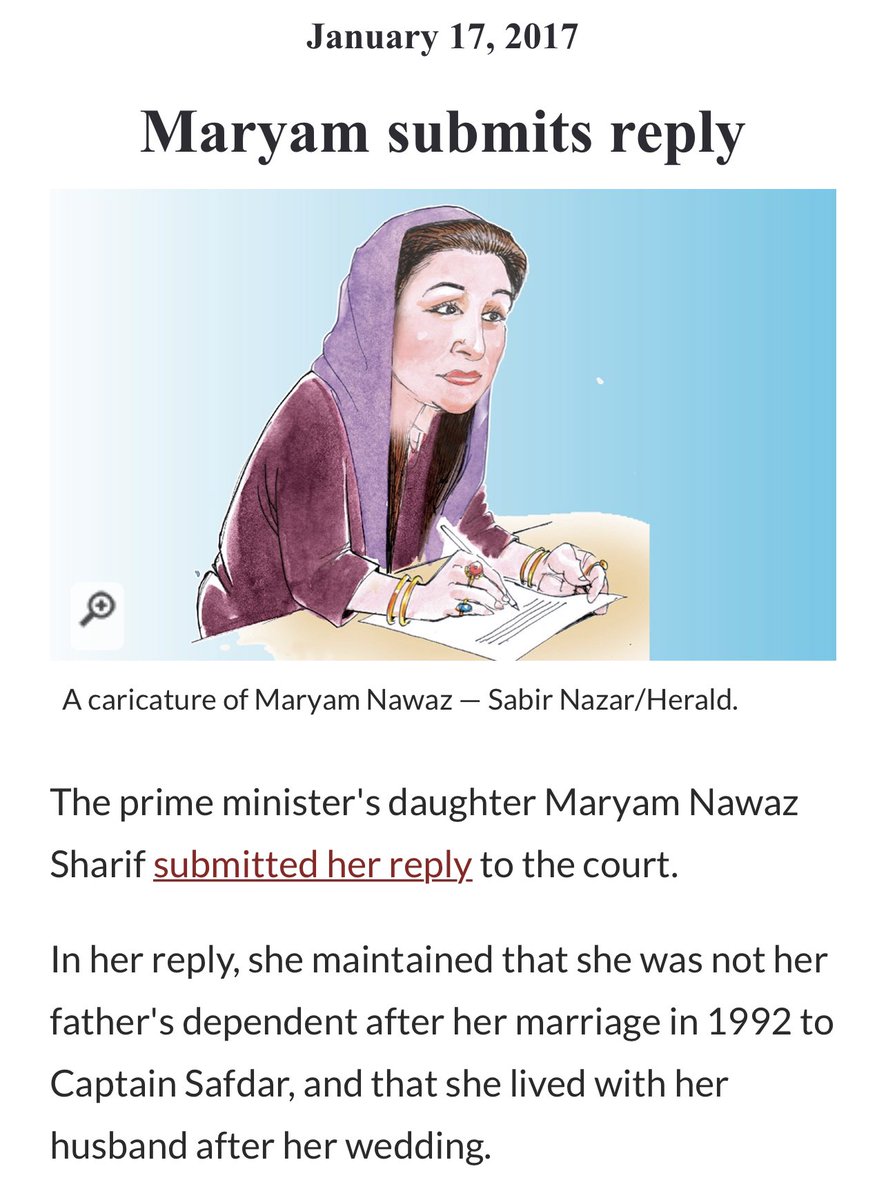
She is building her case when SZ starts sharing documents on Twitter which are again, only good for selling pakoras. There is nothing incriminating in the new "evidence" yet the german newspaper worded the tweet to make it sound like they had just uncovered something. 







Don't forget, SZ, nor the two journalists who wrote the book never did a story on Pakistan, in the first place. Even after torturing the data for a year. They just couldn't build any story. And they still cannot. But they didn't hesitate to interfere in a subjudice matter.
https://twitter.com/khayazahmed/status/1652466041220661248
Ishaq Dar's "confession" in the Hudaibya Paper Mills (HPM) reference is brought up again in the SC. Judges question NAB why the judgement that quashed the reference was not appealed. As if all convictions that are overturned should be appealed and taxpayer money grows on trees. 

Justice Khosa also questions why the PM had not mentioned the deal with the Qataris in his speech. Justice Saeed suddenly develops heart problems and is shifted to Rawalpindi Institute of Cardiology. The bench resumes hearings two weeks later, and Justice Saeed is a new man now. 

Justice Saeed, who had earlier disagreed on the matter of "burden of proof," now starts asking the defendants to present documents that prove Hussain Sharif's ownership of the properties. 

Maryam then presents a Trust deed which was executed between Hussain and herself in 2006, after which Maryam acted as a trustee over the properties but the beneficial ownership always remained with Hussain Nawaz. 

The SC gets swayed as PTI starts raising objections and suspicions over the Qatari letter, and concedes to demands of PTI and summons records of all references against the PM from the last decade, many that had already been quashed. 

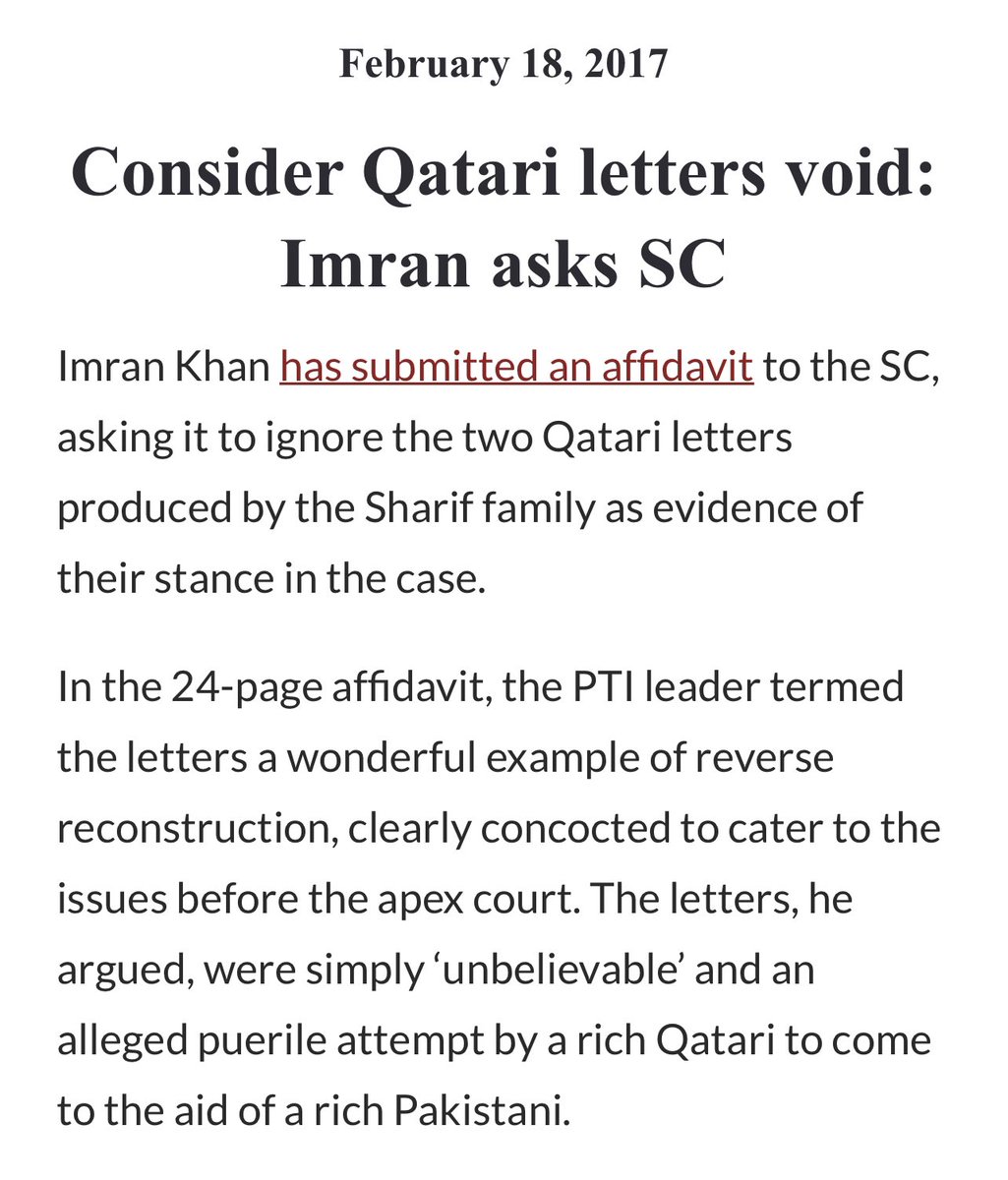

The judgement is finally reserved on April 20, 2017. It is a 3-2 split verdict, with the majority calling for further investigations through a six-member Joint Investigation Team which should include two serving military officers from the intelligence services. 



Justice Khosa and Justice Gulzar had already made up their mind and were ready to disqualify the PM right then. With what evidence? It still remains unclear.
But the majority decided to keep the sword hanging, much to the advantage of PTI, as election year was dawning.
But the majority decided to keep the sword hanging, much to the advantage of PTI, as election year was dawning.
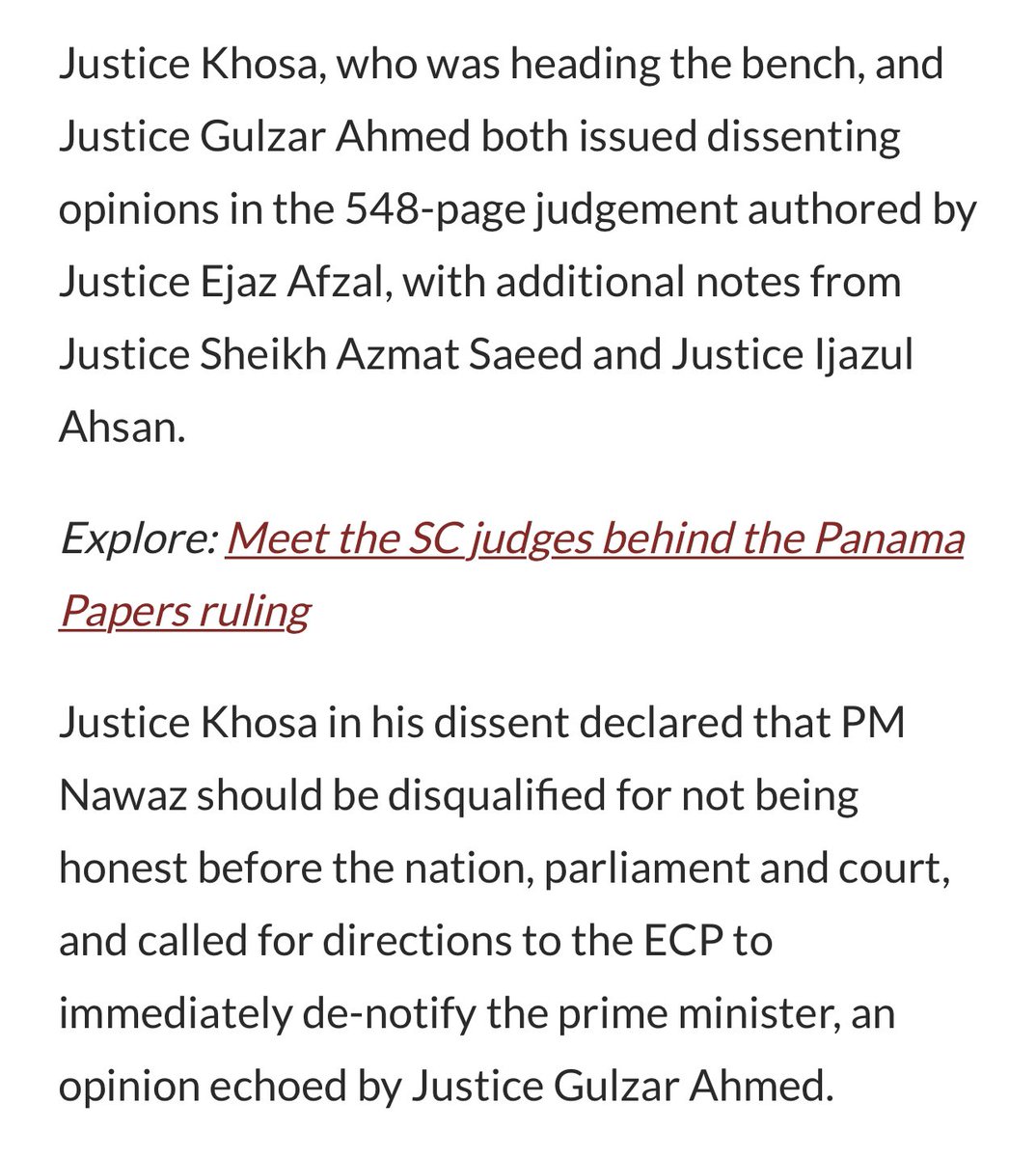
The SC proposed six different institutions (SBP, SECP, NAB, FIA, MI, ISI) to send a list of officers from which it would select one from each and constitute the JIT. 

A special "implementation" bench has also been formed to "monitor the progress of the JIT".
The institutions send in their recommendations on April 26.
The very next day, the SC seeks more names from the SBP and the SECP.


The institutions send in their recommendations on April 26.
The very next day, the SC seeks more names from the SBP and the SECP.



The next day, on April 28, SECP Chairman Zafar Hijazi discloses to the SC that he received a phone call on Whatsapp from someone who called himself the SC Registrar, asking him to include a person named Bilal Rasool in the list of recommendations from SECP. 





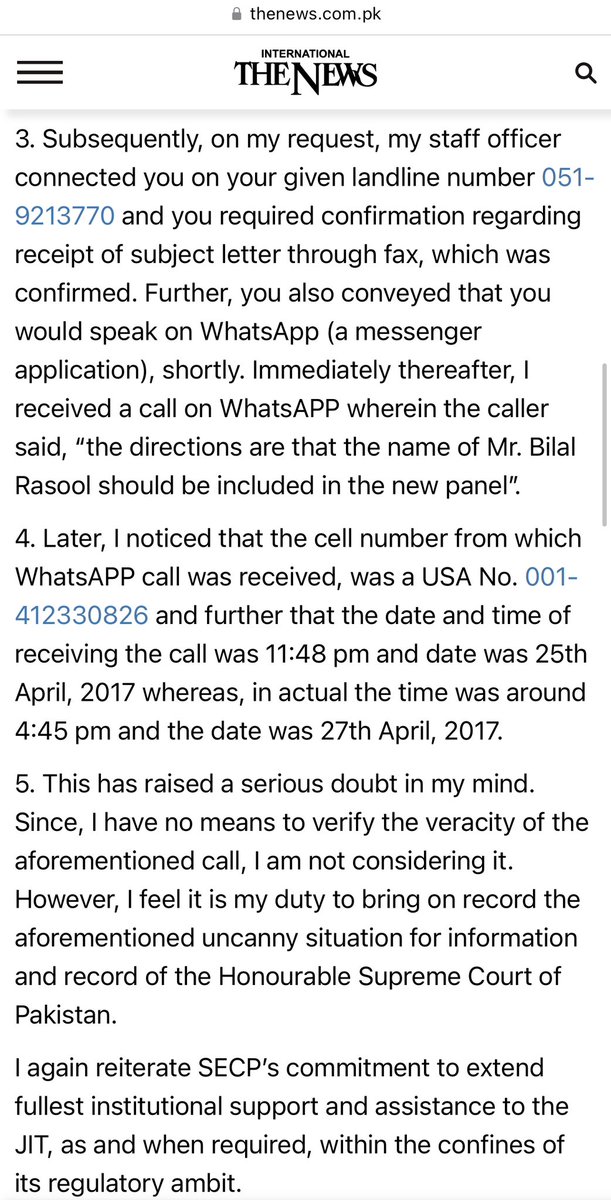

Similar reports came out of the SBP and NAB, that a mysterious caller identifying himself as the SC registrar, had seeked the names of Amer Aziz (SBP) and Irfan Naeem Mangi (NAB) for inclusion in the list. 

The SC summons the SECP Chairman Zafar Hijazi and the Chairman of the State Bank of Pakistan to court.
"We expect people with integrity,"
"We want honest and professional officials to be members of the JIT."

"We expect people with integrity,"
"We want honest and professional officials to be members of the JIT."


The SC had violated the very thing it was designed to protect. Dignity of man is no joke. Who were these officers who lacked integrity, were dishonest, and unprofessional? How can the SC label working people as such, and get away with it? 😔 



Anyways, the SC then asks for a list to be furnished on May 5th, of all officers above Grade 18, in order to cherry-pick people they believe have integrity, are honest and professional. There are more reports that this team is being constituted through 'Whatsapp consultations.' 

The implementation bench was in clear violation of an order of a larger five-member bench, which had specifically mentioned that names of nominees would be recommended by the heads of the institutions for nomination and approval. 

There was no other way they could get the names they had been seeking. What was the criteria being used to accept or reject nominations? How is the SC wiser than the heads of the respective institutions in knowing who is suitable for the job?
On May 5th, the same day they receive a list of "all officers above grade 18", without wasting further time, the SC forms the JIT.
🚨🚨
Guess who made it to the JIT? 😳
1. Amer Aziz from SBP
2. Bilal Rasool from SECP
3. Irfan Naeem Mangi from NAB
🚨🚨
Guess who made it to the JIT? 😳
1. Amer Aziz from SBP
2. Bilal Rasool from SECP
3. Irfan Naeem Mangi from NAB

• • •
Missing some Tweet in this thread? You can try to
force a refresh

 Read on Twitter
Read on Twitter














